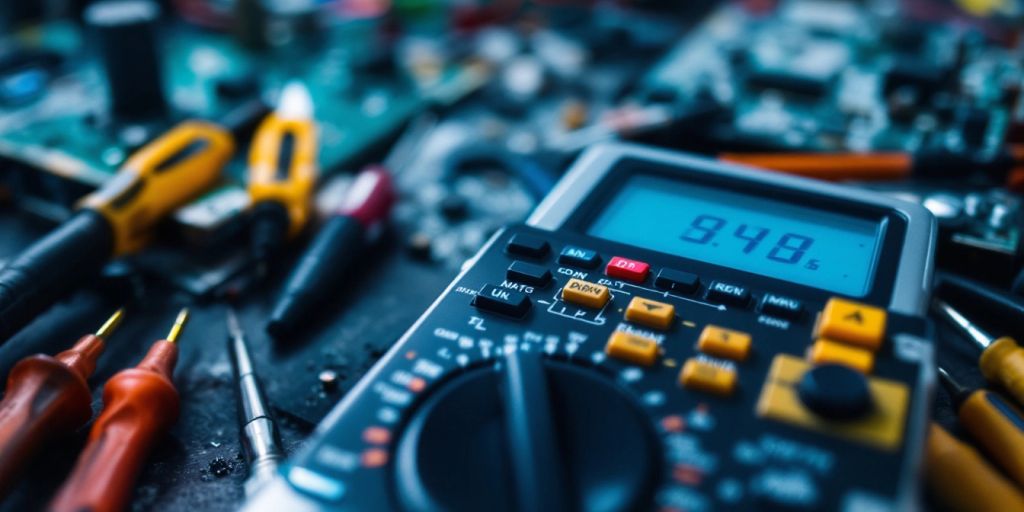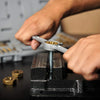
The Role of Digital Multimeters in Computer Repair: A Beginner’s Guide
Digital multimeters (DMMs) are essential tools for anyone involved in computer repair and can be found in any advanced computer repair tool kit. They help diagnose issues by measuring voltage, current, and resistance. Here are some key features to consider:
Understanding Display and Interface
A clear and large display is crucial for reading measurements easily. A backlight is especially useful when working in dimly lit areas, allowing you to see the readings without straining your eyes. Most DMMs have a simple interface that makes it easy for beginners to navigate.
Importance of Auto-Ranging
Auto-ranging is a feature that automatically selects the correct measurement range. This is beneficial for beginners, as it eliminates the need to manually adjust settings. It ensures accurate readings without confusion, making troubleshooting faster and more efficient.
Probes and Accessories
The quality of probes can significantly affect your measurements. Look for:
-
Durable probes that can withstand wear and tear.
-
Piercing probes that allow you to test wires without stripping them.
-
Additional accessories like alligator clips for hands-free testing.
Safety Features to Consider
Safety should always be a priority when working with electrical devices. Key safety features include:
-
Overload protection to prevent damage to the multimeter.
-
A rubber casing to protect against drops.
-
CAT ratings that indicate the multimeter's safety level for different environments.
Always prioritize safety features when selecting a multimeter. They can save you from potential hazards while working on electronic devices.
In summary, understanding these essential features will help you choose the right digital multimeter for your computer repair needs. Whether you're a beginner or an experienced technician, having the right tools can make all the difference in your repair work.
Using a Digital Multimeter in Your Computer Repair Tool Kit
Digital multimeters (DMMs) are essential tools for anyone involved in computer repair. They help diagnose various issues by measuring voltage, current, and resistance. A reliable multimeter can save you time and money by pinpointing problems quickly.
Testing Power Supply Units
-
Check Voltage Output: Ensure the power supply is delivering the correct voltage.
-
Test for Short Circuits: Identify any shorts that could damage components.
-
Measure Current Draw: Determine if the power supply is overloaded.
Diagnosing Motherboard Issues
-
Check for Shorts: Use the multimeter to find shorts on the motherboard.
-
Test Voltage Levels: Measure the voltage at various points to ensure proper operation.
-
Inspect Capacitors: Check for faulty capacitors that may cause failures.
Checking Continuity in Cables
-
Test Cable Integrity: Ensure cables are not damaged or broken.
-
Identify Open Circuits: Use the continuity setting to find breaks in the circuit.
-
Verify Connections: Confirm that connections are secure and functioning.
Measuring Voltage and Current
-
Set the Multimeter Correctly: Choose the right setting for AC or DC measurements.
-
Measure Voltage Levels: Check the voltage at different points in the circuit.
-
Monitor Current Flow: Use the ammeter function to measure current in the circuit.
A digital multimeter is not just a tool; it’s a gateway to understanding the electrical systems in your devices. With practice, you’ll become proficient in using it for various repairs.
In summary, a digital multimeter is a versatile tool that can assist in various aspects of computer repair. Whether you're testing power supplies, diagnosing motherboards, checking cables, or measuring voltage and current, having a DMM in your toolkit is invaluable. For beginners, starting with a budget-friendly option like the Hi-Spec 84pc electronics & solder iron kit can provide all the essentials needed for effective repairs.
Choosing the Right Digital Multimeter for Your Needs

Advanced Features for Professionals
If you're looking for more advanced capabilities, consider these features:
-
Capacitance Measurement: Useful for testing capacitors.
-
Temperature Measurement: Handy for diagnosing overheating components.
-
Frequency Measurement: Important for more complex electronic repairs.
User Reviews and Recommendations
Before making a purchase, check user reviews. Here are some tips:
-
Look for feedback on accuracy and durability.
-
Consider how easy it is to use for beginners.
-
Check if the customer service is responsive.
Choosing the right multimeter is crucial for effective computer repair. A good multimeter can help you diagnose issues quickly and accurately, making it an invaluable tool in your toolkit.
In summary, whether you're a beginner or a professional, selecting the right digital multimeter can significantly impact your repair work. Make sure to consider your specific needs and budget before making a decision.
Practical Tips for Beginners Using Digital Multimeters
Setting Up Your Multimeter
When you first get your digital multimeter (DMM), it’s important to set it up correctly. Here are some steps to follow:
-
Read the manual to understand the features.
-
Insert the probes into the correct ports: red for positive and black for negative.
-
Turn the dial to the correct setting for what you want to measure.
Common Mistakes to Avoid
Beginners often make mistakes that can lead to inaccurate readings or even damage. Here are some common pitfalls:
-
Forgetting to unplug appliances before testing.
-
Using the wrong setting on the multimeter.
-
Not checking the battery level of the multimeter before use.
Interpreting Readings Accurately
Understanding what your multimeter is telling you is crucial. Here’s how to interpret readings:
-
Voltage: Look for a number followed by "V". This tells you the voltage level.
-
Current: Measured in "A" (Amperes), this shows how much current is flowing.
-
Resistance: Indicated by "Ω" (Ohms), this tells you how much resistance is in the circuit.
Maintaining Your Multimeter
To ensure your multimeter lasts, follow these maintenance tips:
-
Keep it clean and free from dust.
-
Store it in a safe place when not in use.
-
Regularly check the probes for wear and tear.
Remember: Before you check anything with a multimeter, make sure appliances are unplugged, all plugs are removed from outlets you are testing, and batteries being tested are disconnected. This ensures your safety and the accuracy of your measurements.
Related Article: How to use Diagnostic Tools in Computer Repair
The Essential Digital Multimeter
Digital multimeters are essential tools for anyone interested in computer repair. They help you measure voltage, current, and resistance, making it easier to find and fix problems. Whether you're a beginner or someone with more experience, knowing how to use a multimeter can save you time and money. With practice, you'll become more confident in diagnosing issues and making repairs. Remember, every expert started as a beginner, so don't hesitate to use this handy tool in your next project!
Related Article: Computer Tool Kit Guide: Everything You Need to Know



